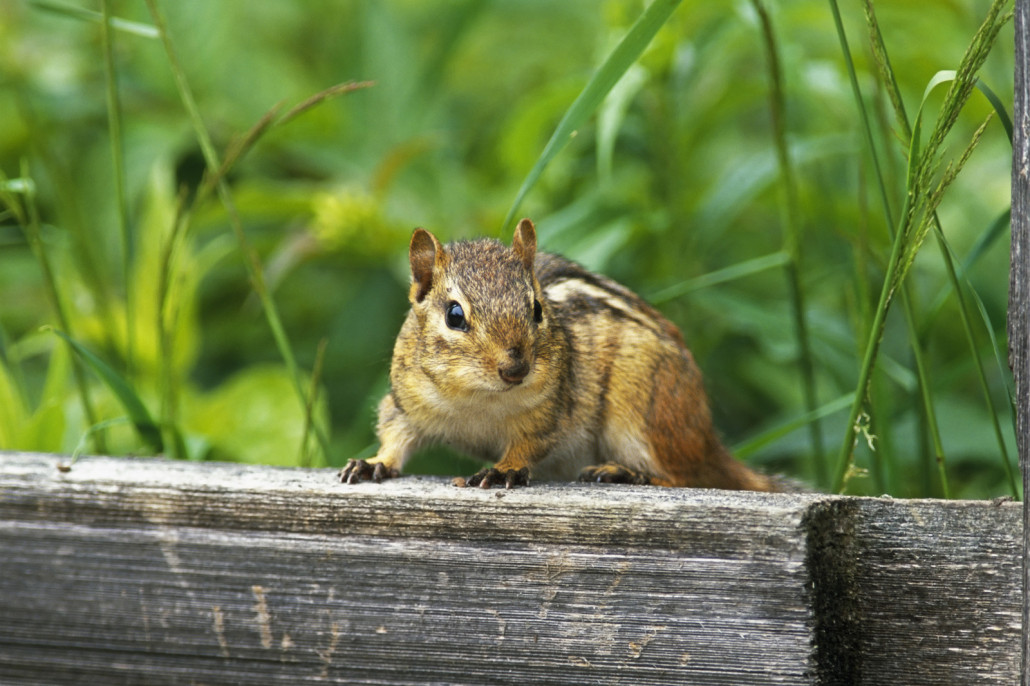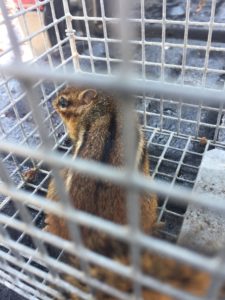
Chipmunk Trapping and Chipmunk Removal in Richmond VA
Richmond, VA Chipmunk Trapping and Chipmunk Control – Virginia
(804) 729-0046 or toll-free at (888) 824-7383
Chipmunks damaging your home or property? Chipmunk Removal, Chipmunk Trapping & Chipmunk Control in Central VA. As specialist in chipmunk trapping and chipmunk control in Central Virginia, Virginia Professional Wildlife Removal Services provides nuisance chipmunk trapping, chipmunk removal, chipmunk trapping, chipmunk capture, chipmunk control, chipmunk management and chipmunk exclusion services for the Richmond VA, Henrico VA, Chesterfield VA, Midlothian VA and Charlottesville VA areas of Virginia. One of the most frequent questions we are asked concerns how to get rid of chipmunks.
People are often alarmed to find that chipmunks have taken over their yard, digging holes everywhere, eating their bird seed and pet’s food, or chewing electrical wires. They want them gone as quickly as possible and want to know how to kill chipmunks. They destroy your lawn and dig up your gardens leaving a big mess.
If you have problems with chipmunks chewing your wiring and house, eating your bird seed and pet’s food, damaging your plants or garden, or just being a nuisance pest give us a call at (804) 729-0046 or toll-free at (888) 824-7383. Chipmunk removal and control is one of our specialties. We have trained wildlife removal experts ready to assist you with any animal pest control critter.
Chipmunk Identification in Virginia
- There are fifteen species of native chipmunks found in North America
- The eastern chipmunk (Tamias striatus) and the least chipmunk (Eutamias minimas) are the two most widely distributed and notable species.
- Behavior and damage is similar among all species of native chipmunks in Richmond VA. Therefore, damage control recommendations are similar
for all species. - The eastern chipmunk is a small, brownish, ground-dwelling squirrel. It is typically 5 to 6 inches (13
to 15 cm) long and weighs about 3 ounces (90 g). It has two tan and five blackish longitudinal
stripes on its back, and two tan and two brownish stripes on each side of its face. The longitudinal
stripes end at the reddish rump. The tail is 3 to 4 inches (8 to 10 cm) long and hairy, but it is not
bushy. - The least chipmunk is the smallest of the chipmunks. It is typically 3 2/3 to 4 1/2 inches (9 to 11 cm)
long and weighs 1 to 2 ounces (35 to 70 g). The color varies from a faint yellowish gray with tawny
dark stripes to a grayish tawny brown with black stripes. The stripes, however, continue to the base of the tail on all least chipmunks. - Chipmunks are often confused with thirteen-lined ground squirrels (Spermophilus tridecemlineatus),
also called “striped gophers,” and red squirrels (Tamiasciurus hudsonicus). - The thirteen-lined ground squirrel’s call sounds like a high-pitched squeak, whereas chipmunks have a rather sharp “chuck-chuck-chuck” call.
Chipmunk Habitat and General Biology in Virginia
- Eastern chipmunks typically inhabit mature woodlands and woodlot edges, but they also inhabit areas in and around suburban and rural homes.
- Chipmunks are generally solitary except during courtship or when rearing young.
- The home range of a chipmunk may be up to 1/2 acre, but the adult only defends a territory about 50 feet (15.2 m) around the burrow entrance.
- Chipmunks are most active during the early morning and late afternoon.
- Chipmunk burrows often are well-hidden near objects or buildings (for example, stumps, wood piles or brush piles, basements, and garages). The burrow entrance is usually about 2 inches (5 cm) in diameter. There are no obvious mounds of dirt around the entrance because the chipmunk carries the dirt in its cheek pouches and scatters it away from the burrow, making the burrow entrance less conspicuous.
- With the onset of cold weather, chipmunks enter a restless hibernation and are relatively inactive from late fall through the winter months. Chipmunks do not enter a deep hibernation as do ground squirrels, but rely on the cache of food they have brought to their burrow. Some individuals become active on warm, sunny days during the winter. Most chipmunks emerge from hibernation in early March.
- Eastern chipmunks mate two times a year, during early spring and again during the summer or early fall. There is a 31-day gestation period. Two to 5 young are born in April to May and again in August to October. The young are sexually mature within 1 year. Adults may live up to 3 years.
- Chipmunk pups appear above ground when they are 4 to 6 weeks old — 2/3 the size of an adult. Young will leave the burrow at 6 to 8 weeks.
- Population densities of chipmunks are typically 2 to 4 animals per acre. Eastern chipmunk population densities may be as high as 10 animals per acre, however, if sufficient food and cover are available. Home ranges often overlap among individuals.
Do Chipmunks Hibernate?
Chipmunks in the Richmond, Henrico, and Charlottesville areas of Central Virginia do hibernate. Chipmunks hibernate in winter, but they don’t sleep all the way through the season. They retreat to their burrows but wake every few days, raise their body temperatures to normal, feed on stored food rather than fat reserves, and urinate and defecate.
Chipmunk Damage and Damage Identification in Virginia
- Throughout their Virginia range, chipmunks are considered minor agricultural pests.
- Most conflicts with chipmunks are nuisance problems. They may consume flower bulbs, seeds, or seedlings, as well as bird seed, grass seed, and pet food that is not stored in rodent-proof storage containers.
- When chipmunks are present in large numbers they can cause structural damage by burrowing under patios, stairs, retention walls, or foundations.
- Because their holes are often hidden, pets can easily hurt themselves if they stepped in one of their holes by accident.
- Chipmunks can also block pipes around your home with nesting materials, food stuffs and fur balls.
- Chipmunks often chew wires and will take up residence in your home if they can find an opening in which to enter.
Health Concerns From Chipmunks in Virginia
- Avoid direct contact with chipmunks since there is a risk of disease transmission or being bitten. (Source: Prevention and Control of Wildlife Damage, 1994)
- Chipmunks can carry a lot of diseases that can be spread to humans and other animals.
Benefits of Having Chipmunks in Your Yard
Having chipmunks around it not all bad. The are gatherers of nuts and seeds. These nuts and seed are spread around their home area which contributes to new plant growth and the availability of food for carnivores.
How to Get Rid of Chipmunks
 How do you get rid of chipmunks is a question we are often asked. The best way to get rid of chipmunks and to keep chipmunks away is by eliminating available food sources if at all possible. This includes seed type bird feeders and pet food left outside for your family’s pet. I would not waste my money on chipmunk repellents, they simply do not work. Also, people have been know to use mothballs as a chipmunk repellent. Mothballs are not made to repel chipmunks, and they are toxic to you, your family, your pets and the environment. You should never use poisons to get rid of chipmunks in your yard – It may be illegal and there is always the possibility of secondary poisoning. The best way to get rid of chipmunks is by hiring a professional chipmunk removal and chipmunk control company like us.
How do you get rid of chipmunks is a question we are often asked. The best way to get rid of chipmunks and to keep chipmunks away is by eliminating available food sources if at all possible. This includes seed type bird feeders and pet food left outside for your family’s pet. I would not waste my money on chipmunk repellents, they simply do not work. Also, people have been know to use mothballs as a chipmunk repellent. Mothballs are not made to repel chipmunks, and they are toxic to you, your family, your pets and the environment. You should never use poisons to get rid of chipmunks in your yard – It may be illegal and there is always the possibility of secondary poisoning. The best way to get rid of chipmunks is by hiring a professional chipmunk removal and chipmunk control company like us.
Want to know how to catch a chipmunk? We can safely and humane get rid of your chipmunk problem with our exceptional chipmunk trapping program. We use only humane chipmunk traps.
Chipmunk Traps
The use of live traps and body grip traps have been proven effective in catching chipmunks.
Chipmunk Bait
Pecan paste and seeds are probably the most effective baits to use for trapping chipmunks.
How to Trap a Chipmunk
Live traps are effective in getting rid of chipmunks. Place the trap in a shaded area that the chipmunks frequently visit with a cup of chipmunk bait. Disguise the trap by lightly covering the inside and outside of the trap with plant material. Check the trap at least once daily to prevent the chipmunk from suffering and dying an inhumane death.
Our Service Areas for Chipmunk Removal in Virginia
Virginia Professional Wildlife Removal Services is a full-service chipmunk trapping, chipmunk control, and chipmunk removal company providing residential, commercial and industrial animal removal services throughout Virginia. Our service area includes the counties, cities, towns and communities of Afton, Albemarle County, Alexandria, Amelia County, Annandale, Arlington, Ashburn, Ashland, Barboursville, Bellwood, Belmont, Bensley, Bermuda Hundred, Bon Air, Boyd Tavern, Brandermill, Bumpass, Burke, Central VA, Centreville, Chamberlain, Charlottesville, Chesapeake, Chester, Chesterfield County, Colonial Heights, Crozet, Cuckoo, CVille, Dale City, Doswell, Dumbarton, Earlysville, East Highland Park, Enon, Ettrick, Fairfax, Fair Oaks, Ferncliff, Fluvanna County, Fredericksburg, Genito, Glen Allen, Glenora, Goochland County, Gordonsville, Gum Spring, Hadensville, Hampton, Hampton Park, Hanover County, Harrisonburg, Harrogate, Hening, Henrico County, Highland Springs, Hopewell, Innsbrook, Jefferson Davis, Kents Store, Keswick, Lake Anna, Lake Monticello, Lake Ridge, Lakeside, Laurel, Leesburg, Lewiston, Lignum, Locust Grove, Louisa County, Maidens, Manakin, Manakin-Sabot, Manassas, Manchester, McLean, Montrose, Motoaca, Meadowbrook, Mechanicsville, Midlothian, Mineral, Moseley, Newport News, Norfolk, North Courthouse, North Garden, Oilville, Orange County, Palmyra, Pantops, Petersburg, Portsmouth, Powhatan County, Reams, Reston, Richmond, Richmond County, Robious, Rockville, Rockwood, RVA, Salisbury, Sandston, Sandy Hook, Scottsville, Shannon Hill, Short Pump, South Rockwood, Spring Run, Staunton, Stoney Point, Suffolk, Tidewater, Troy, Tuckahoe, Va, Varina, Virginia, Virginia Beach, Waynesboro, Williamsburg, Winchester, Winterpock, Woodlake, Wyndham, and the surrounding areas of Virginia.
Please Complete Our Simple Contact Form Below:
 Contact Us at (804) 729-0046 or toll-free at (888) 824-7383 for Virginia animal trapping, animal control, wildlife removal, pest control, animal capture, animal exclusion or wildlife management in VA involving:
Contact Us at (804) 729-0046 or toll-free at (888) 824-7383 for Virginia animal trapping, animal control, wildlife removal, pest control, animal capture, animal exclusion or wildlife management in VA involving:
- Bats (Little Brown Bat, Big Brown Bat, Others)
- Beavers
- Bees
- Birds
- Bobcats
- Canada Geese
- Chipmunks
- Copperhead Snakes
- Cottonmouth Snakes
- Coyotes
- Dead Animal Removal
- Deer
- European Starlings
- Flying Squirrels
- Foxes (Red and Gray)
- Groundhogs
- Mice
- Moles
- Muskrats
- Opossums
- Otters
- Pigeons
- Possums
- Raccoons
- Rats
- Rattlesnakes
- Skunks
- Snakes
- Southern Flying Squirrels
- Squirrels
- Stinging Insects
- Voles
- Woodchucks